- Home
- Alice Hoffman
Angel Landing Page 19
Angel Landing Read online
Page 19
“It could be different this time,” I said.
“Could it be?” Finn shook his head. “I’ll be damned if I ever give anyone the chance to do to me what I did to her. And I couldn’t do it to someone else again.”
Finn’s face was set in anger, and I realized how little I knew him, and how possible it was that he could be cruel. Maybe I was lucky that he wanted to turn away from me; I might have been saved from some terrible mean streak I never even imagined if I now walked past the soft gray reeds, and left him alone with his memories.
“Who was she?” I asked.
“Does it matter?” Finn asked.
Gulls circled the beach house in the dark, sleet had coated the deck like a second skin.
“I think it might,” I said.
“It was a long time ago,” Finn said carefully. “There was a woman.”
Already I could see her; she walked barefoot in summer, she smiled slowly, easily; she put her arm through Finn’s and called him darling. I didn’t want to hear about her, I wanted to hear every word. I waited for Finn to go on, hoping that once she was before us, standing on the deck of the beach house, we would be rid of her once and for all.
TWO
WHEN HE WAS TWENTY-one, Michael Finn drove down to Buckley, West Virginia, during a summer when there were record heat waves and the hills he drove through had turned a parched gold color, like a woman’s hair that had been too long in the sun. It was the start of things going dry in New York, and many of the men in Finn’s union had found jobs in faraway places, places as promising as San Jose and Santa Fe, and as poor and desolate as Buckley, West Virginia.
If Finn hadn’t known his destination he might have felt free, he might have enjoyed speeding down the New Jersey Turnpike in his battered Ford Falcon, he might have noticed owls in the trees when he passed over the Pennsylvania state line at dusk. But Finn knew that he was not driving on to New Mexico or California; he was headed toward a small mining town hidden in the hills, a town full of construction workers building a new coal-processing plant, and Finn didn’t smile once the whole drive down.
When he first saw Buckley, from high atop the Interstate, Finn’s heart dropped, it sank down low; not in his worst dreams had Finn imagined the thick halo of smoke that surrounded the town, he could not have guessed that a long stretch of clothesline strung from tree to tree in front of an old farmhouse could have made him so sad. He pulled into town and rented a room in a boarding house right away. That first night he lay on a small metal-framed bed with all his clothes on; he left the bedside lamp on. Even though he didn’t move a muscle as he lay there, Finn felt as though he were still driving, the white highway line seemed to be right in front of him.
When Finn reported to the half-built power plant for work, he tried to pretend that he was a drifter, a man just passing through town, instead of another construction worker trapped in Buckley by the overtime that would send his paycheck over five hundred dollars each week. Like all the other workers, Michael Finn took on as much overtime as he could get, even if that meant staying for twelve hours or more in the broiling hot rooms of the plant, metal rooms that did not cool down even after the sun had set and the night birds flew from tree to tree. When he finally returned to the boarding house each night, his room was a furnace; if Finn touched the iron bedpost he burned his fingertips. The toilet was down the hall, and Finn’s landlady had announced that boarders were allowed only one shower a day, and she was none too pleased if they all took one, for water wasn’t free. Nothing in Buckley was free; it was a town so poor that when it finally saw money, in the high paychecks of the out-of-state construction workers, the entire town whistled, winked, and raised prices by nearly double. Because there was so little to spend money on in town, workers bought whatever there was, and mostly there was alcohol. Even Finn, who had never been a drinker, found himself spending every evening until closing time in the Iron Horse, a bar crowded with arguments, and money, and hot, unmoving summer air.
It was there, at the bar of the Iron Horse, that Michael Finn met Marlene. He had ordered a gin and tonic, which was bitter and warm, when Marlene first saw him, and immediately she knew something was about to happen. Marlene was twenty-seven, six years older than Finn, and she hadn’t been to the Iron Horse for months. The mother of a six-year-old girl called Sunny, she was on welfare—and if her brother, Ben, didn’t take her out for a drink and spring for the price of a babysitter, Marlene wouldn’t have gone anywhere at all. When she noticed Finn sipping his drink, Marlene knew that she would take him home with her when she left. She wasn’t afraid: Marlene had lived in Buckley all her life, and once someone else lived there, too—even for a day or a week—he was no longer an outsider as far as Marlene was concerned.
“I like his looks,” Marlene murmured to her brother. She nodded toward Finn.
“You’ve got to watch out for construction workers,” Ben, a miner, said. “They move around so much, they’re in another state before you blink your eyes or pull your zipper up, and they all have wives back home.”
“They can’t all be married,” Marlene said.
“Well, most of them are,” Ben said grudgingly, straining to see if there was a wedding band on Finn’s finger. Ben was younger than Marlene, and he was convinced that nothing was too good for her. Although he tried to persuade Marlene to forget about the man at the other end of the bar, she hadn’t been out for months and was determined not to go home alone. As for Finn, he was so lonely that evening that he found himself smiling when Marlene walked over to him.
“Drinking gin?” Marlene asked. When Finn nodded, she smiled. “They make the best gin and tonics in the world here,” Marlene confided, which should have let Finn know, right away, that he was about to become involved with a West Virginia woman who believed in absolutes.
They left the Iron Horse together an hour later, although Finn hadn’t uttered more than a dozen sentences. But his reserve didn’t bother Marlene one bit—she always said she had a thing for strong, silent types. She slid into the front seat of Michael Finn’s Falcon as if Finn were an old trusted friend; and, leaving young Ben behind to worry and order another beer, they drove to the edge of town, where Marlene and her daughter lived in a trailer park surrounded by tall, green pines.
Marlene went in alone to dismiss the babysitter, who lived only a few trailers away; but she was back for Finn before he had time to change his mind and drive out of the trailer camp at full speed, leaving a cloud behind him as he fled over the dirt road. Instead of running away, he allowed Marlene to lead him across the pine needles. Once inside the trailer, she held a finger to her lips. They tiptoed by the cot in the living room where Sunny slept, covered up to her neck by a cotton quilt, even though it was nearly eighty outside, and the midnight temperature inside the trailer was surely higher. Marlene’s bedroom was so small that there was room for only her double bed, carefully made up with pink flowered sheets, and a wooden dressing table loaded with bottles of cologne. After they had undressed, Finn was surprised that Marlene was nearly beautiful; he was even more surprised when she dropped to her knees and took his penis into her mouth and actually seemed to like doing so. Michael Finn could hardly protest, he had been lonely for a very long time, for as long as he could remember; he closed his eyes and tried to pretend that he was no longer alone.
After that first time, Finn saw Marlene more and more often. Soon it was every night. She had begun to assume that he would come around to her trailer as soon as he had gone back to the boarding house after work to shower and get rid of his work clothes; and to Finn, anything would have been better than the still heat of his rented room. The truth was, Finn was intoxicated by Marlene’s beauty, by the easiness of their relationship, and by Marlene’s low expectations—if he didn’t say a word for hours, Marlene didn’t seem to care. If there was anything in that trailer that could disrupt the comfortable routine Finn had settled into, it was Marlene’s daughter, Sunny.
How she had gotten her na
me Finn never knew. Certainly it was not because she was tall and fair like her mother; Sunny was small for six, and her hair was cut in rough bangs which nearly hid her eyes. And it was not because of the girl’s disposition; she was often glum, she read books in the corner of the trailer, and went outside in the summer heat only when bribed with ice cream or the promise of a swim. Marlene had admitted that she was not certain who Sunny’s father was—she had been seeing two men around that time—a local boy who had later been killed in Vietnam, and a marijuana dealer who drove a Corvette and left town several months before Sunny was born. At first Sunny did not like Finn and refused to talk to him, but by the time he moved his suitcase out of the boarding house and into the trailer, she no longer cried each time he came through the door. Three months had passed since the day of Finn’s arrival in Buckley, and although dinner was waiting for him every night when he came home to the trailer, Michael Finn still felt like an outsider; he was still driving down that white-lined highway.
What really changed things, what let Finn know that he was no longer a stranger in Buckley, but a man who might actually get stuck in a small West Virginia town, happened one morning when he drove Sunny to school. Now and then Finn would drop her off—the elementary school was on the way to the coal plant, and Marlene was convinced that the early morning drives would bring the two closer together. And, after a few trips together, Sunny and Finn were able to hold polite conversations; they discussed what was eaten for breakfast, and how hot it was for mid-September. It was Finn who did most of the talking; even though he was a man most comfortable without words, he could not bear to see Sunny sit so quietly in the front seat of the Falcon. Sometimes, when the two of them were riding together, Finn had the impulse to stop the car and drop Sunny off on a deserted stretch of road. But he was never quite certain how he would feel if the girl disappeared; he might be thankful for one less interference in his life, or he might just as possibly grieve.
One morning, when the heat blew through the open window in waves, Finn felt he simply couldn’t go on. Life was too hot, too lonely, and much too long.
“Jesus Christ,” Finn muttered. He lit a cigarette and inhaled. He could barely tell the difference between the heat of the cigarette smoke and the heavy morning air. “I’d give anything not to go to work today,” Finn said to himself.
“Anything?” Sunny said, wrinkling her face and biting her lower lip. “I’ll give you a quarter.”
Finn looked at her, surprised. “Where would you get a quarter?” he asked.
“From you,” Sunny shrugged. “I don’t have any money of my own,” she said with none of the sweetness Finn despised in children.
They made a deal that day: they would take off and go swimming, and not tell Marlene a thing about it. Finn parked in front of the Buckley Five-and-Ten and handed Sunny a five-dollar bill, which she used to buy a cheap yellow bathing suit. After they had driven out of town, Finn parked and then rolled up his jeans while Sunny changed into her new suit behind a grove of pines which stood beside the nearly deserted pond. There were no swimmers, only a troupe of old-timers, fishermen who dipped their bait into the pond without any real hope of a bite.
They didn’t talk much that day, they barely looked at each other. Despite Sunny’s love of the water, she was not a great swimmer; she stayed close to the shore and spent most of the afternoon collecting stones. But Finn swam as though he would never grow tired; he raced across the width of the pond dozens of times, he swam so fast that the old-timers took time away from their fishing to cheer him on. Finn smiled, and shook the water out of his ears; he waved to the group of old men. It was almost as if he was free, as if that coal plant in Buckley didn’t exist; it was almost as if there wasn’t a woman waiting for him, counting the hours until he came home, ready to throw her arms around him, as if he weren’t a man who still felt alone.
They waited for Finn’s jeans to dry; then Sunny disappeared and changed back into her school clothes.
“Are you going to marry my mother?” Sunny asked casually when they walked back to the parked car.
“I don’t know,” Finn admitted. He had never thought about marriage.
“I was just curious,” she said. She was more than that; she felt differently about Finn now, she had decided that he was not so horrible after all, she had begun to want him to stay.
“Do you think I should marry your mother?” Finn smiled.
Because he had to ask that question, Sunny knew Finn had no plans to marry Marlene, he had no real plans at all.
“Yes,” Sunny said quietly.
“Well, we’ll see about that,” Finn said, suddenly nervous. He realized for the first time that he was actually touching people’s lives in a way an outsider never could have. They threw the yellow bathing suit in the trunk of the Ford, and Finn hid it beneath the spare tire he knew Marlene would never touch. “For next time,” he told Sunny. But the girl didn’t answer, she looked at Finn gravely, knowing full well that there would not be a next time. The day had been a freak; the weather would not be this good until next spring, and even if Finn didn’t know it yet, Sunny at least was fairly certain that Finn wouldn’t be around when the pond grew warm again and dragonflies flew over the surface of the water like tiny blue dancers.
Though Sunny trusted her instincts and tried to prepare herself for the day when Finn would leave, she still wanted to keep Michael Finn in Buckley; she may have even wanted it more than Marlene. When Finn and Marlene argued about money, and Finn disappeared for a few days—sleeping in the back seat of the Falcon and drinking six-packs of beer, even though he couldn’t stand the taste of the stuff—Sunny stopped talking. After Finn returned, and Marlene explained that Finn was now back for good, Sunny still refused to look up. She wouldn’t say a word, she refused to be bathed or to comb her own hair. Marlene, who had very little patience, and even less patience with things psychological, took Sunny to the local hospital when spankings and threats did no good. There, Sunny was diagnosed as having autistic tendencies. Marlene was now more satisfied—at least Sunny’s behavior had a name, and all her troubles would go away as quickly and mysteriously as they had come. But Michael Finn knew better. He knew it each time he caught Sunny staring up at him from beneath her dark hair. Sunny was letting Finn know just how much responsibility he had. Still, Finn felt like a transient after eight months in Buckley and the West Virginia accent still grated on his nerves, but the postman and the milkman both knew his name. Michael Finn was suddenly a man with a family.
When Finn phoned his parents in New York at Christmas, Danny Finn lowered his voice at the end of the conversation and said, “I hope you’re getting it down there in West Virginia. Those hill girls open their legs for anyone, but believe me, they want a ring like any other woman.” Finn began to imagine that he was living someone else’s life. He felt as though everything he did—every word he spoke, every kiss, had all been done before. There were terrifying times when Finn imagined that he was living his father’s life, repeating it with slight variations. Yet, when Marlene suggested that they get married, Finn found himself agreeing. He sat Sunny down and told her of their plans, but Sunny watched him suspiciously.
“When are you going to get married?” Sunny asked.
“I don’t know,” Finn said. He saw the girl’s eyes drop to study the floor. “February fifteenth,” Finn said, picking the date arbitrarily and wanting to make Sunny believe that the marriage would truly happen. Finn was rewarded for naming a date; Sunny threw her arms around him and touched her face against his. But as quickly as she had embraced him, she moved away, waiting, perhaps until February 15th, to allow her emotions to surface. Finn began to save his paycheck; banking all that he could in the hope of buying property out in the hills, far from the trailer park, far from the coal plant. But when he told Marlene his plan, she wrinkled her nose.
“The hills?” she said. “Too far away.”
“Far away from what?” Finn asked. They were sitting on the metal
porch of the trailer, bundled up in sweaters, watching the bare trees.
“From everything,” Marlene said firmly. “From town.”
For Marlene, going back to the hills would be a terrible fate. Her own mother had worked on a farm before moving to Buckley; the sorrows of that life had been told to Marlene every day throughout her childhood, so that even talk of moving back to the hills made her shudder. Soon, Finn gave up the idea of owning land, but he continued to bank his paycheck, although he no longer knew what he was saving for. Marlene seemed perfectly happy to stay on in the trailer park forever, and her satisfaction annoyed Finn, and more; it made him keenly aware of how much more he wanted from life. Michael Finn began to go to the Iron Horse again; he imagined that what made him spend hours over a single beer was what had made his own father spend more and more time away from home. An emptiness followed Finn wherever he went, an emptiness Marlene seemed not to notice; she had her younger brother to talk to, and girlfriends she had known all her life. Marlene did not believe in moods; she could get herself out of a rut with one drink or a new blouse or a bouquet of wild flowers that wouldn’t have sold for more than a dollar in the florist’s shop.
The snow began in late January, and there were times when Finn would be sent home from work, without pay, because the weather wouldn’t allow for outside welding at the plant. Most often Finn went straight to the Iron Horse, but some days he drove home and lay down on the bed in the small bedroom. There he would turn his face to the window and watch snow-flakes hit against the panes. On these days he was surprised to discover that Sunny was almost always home too; she rarely went to school and spent most of her time following Marlene around, learning how to set the table and do the wash in the trailer park laundromat, or simply reading in her corner while Marlene watched TV or cooked the hamburgers or macaroni they would eat for dinner.
“Is she sick or something?” Finn finally asked when he returned home in midmorning and found Sunny sorting socks on the living room floor and listening to a portable radio which belted out rock-and-roll hits.

 The Story Sisters
The Story Sisters Local Girls
Local Girls Blue Diary
Blue Diary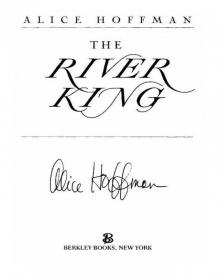 The River King
The River King Here on Earth
Here on Earth Illumination Night: A Novel
Illumination Night: A Novel The Marriage of Opposites
The Marriage of Opposites Nightbird
Nightbird Incantation
Incantation Skylight Confessions
Skylight Confessions The Ice Queen
The Ice Queen Second Nature
Second Nature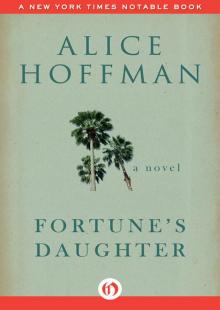 Fortune's Daughter: A Novel
Fortune's Daughter: A Novel Seventh Heaven
Seventh Heaven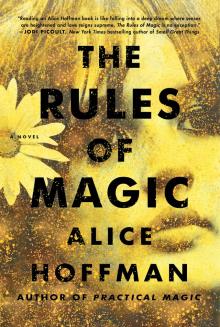 The Rules of Magic
The Rules of Magic The Red Garden
The Red Garden The Third Angel
The Third Angel White Horses
White Horses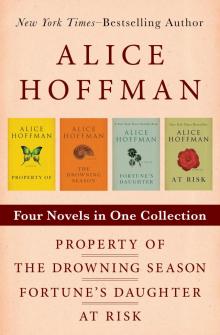 Property of / the Drowning Season / Fortune's Daughter / at Risk
Property of / the Drowning Season / Fortune's Daughter / at Risk Angel Landing
Angel Landing Magic Lessons
Magic Lessons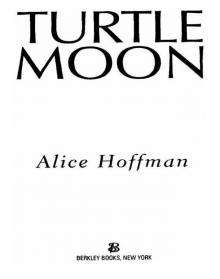 Turtle Moon
Turtle Moon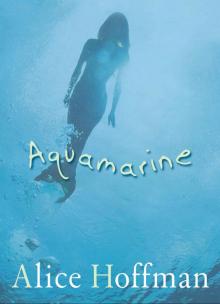 Aquamarine
Aquamarine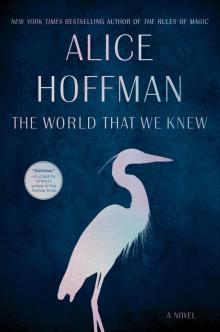 The World That We Knew
The World That We Knew Faithful
Faithful The Dovekeepers
The Dovekeepers The Foretelling
The Foretelling Green Angel
Green Angel At Risk
At Risk Green Heart
Green Heart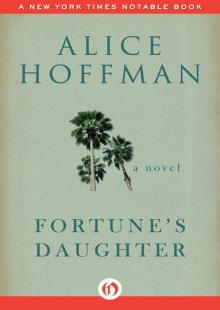 Fortune's Daughter
Fortune's Daughter Faerie Knitting
Faerie Knitting Incantation (v5)
Incantation (v5) Green Witch
Green Witch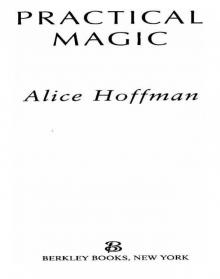 Practical Magic
Practical Magic The Museum of Extraordinary Things
The Museum of Extraordinary Things The Probable Future
The Probable Future Illumination Night
Illumination Night The Dovekeepers: A Novel
The Dovekeepers: A Novel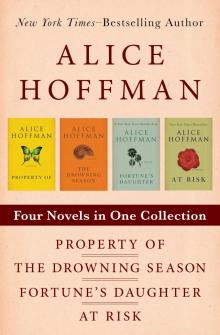 Property Of, the Drowning Season, Fortune's Daughter, and At Risk
Property Of, the Drowning Season, Fortune's Daughter, and At Risk